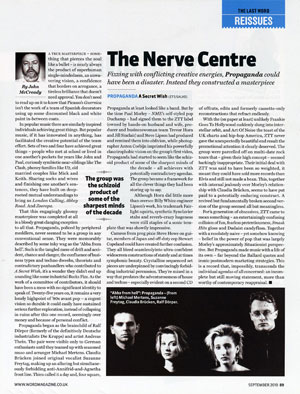Word Magazine: ‘The Nerve Centre’
Author: John McCready / Source: Word Magazine / Published: September 2010
Fizzing with conflicting creative energies, Propaganda could have been a disaster. Instead they constructed a masterpiece.
Propaganda A Secret Wish (ZTT/Salvo)
By John McCready
A true masterpiece – something that pierces the soul like a bullet - is nearly always the product of superhuman single-mindedness, an unwavering vision, a confidence that borders on arrogance, a tireless brilliance that doesn’t need approval. You don’t need to read up on it to know that Picasso’s Guernica isn’t the work of a team of Spanish decorators using up some discounted black and white paint in-between coats.
In popular music there are similarly inspired individuals achieving great things. But popular music, if it has innovated in anything, has facilitated the creative potential of the team effort. Sets of two and four have achieved great things - people who met at school or lived in one another’s pockets for years like John and Paul, curiously symbiotic near-siblings like The Clash, phoney families like U2, old married couples like Mick and Keith. Sharing socks and wives and finishing one another’s sentences, they have built on deep-rooted mutual understandings to bring us London Calling, Abbey Road. And Zooropa.
That this engagingly gloomy masterpiece was completed at all is a bloody great clanging exception to all that. Propaganda, policed by peripheral meddlers, never seemed to be a group in any conventional sense. They were memorably described by some inky wag as the “Abba from hell”. Such is the tangled mess of drift and accident, chance and clanger, the confluence of business types and techno dweebs, theorists and contradictory panhandlers who contributed to A Secret Wish, it’s a wonder they didn’t end up sounding like some industrial Bucks Fizz. As the work of a committee of contributors, it should have been a mess with no significant identity to speak of. Twenty-five years on, it remains a very lonely highpoint of ‘80s avant pop - a cogent vision so durable it could easily have sustained serious further exploration, instead of collapsing in ruins after this one record, seemingly over money and because of personal conflict.
Propaganda began as the brainchild of Ralf Dörper (formerly of the definitively Deutsche industrialists Die Krupps) and artist Andreas Thein. The pair were visible only to German enthusiasts until they teamed up with seasoned muso and arranger Michael Mertens. Claudia Brücken joined original vocalist Suzanne Freytag, making up an alluring but simultaneously forbidding anti-Annifrid-and-Agnetha front line. Thien called it a day and, four square, Propaganda at least looked like a band. But by the time Paul Morley - NME’s self-styled pop Duchamp - had signed them to the ZTT label (owned by hands-on husband and wife, producer and businesswoman team Trevor Horn and Jill Sinclair) and Steve Lipson had produced and remixed them into oblivion, while photographer Anton Corbijn imprinted his powerfully claustrophobic vision on the group’s first video, Propaganda had started to seem like the schizoid product of some of the sharpest minds of the decade - all achievers with potentially contradictory agendas. The group became a framework for all the clever things they had been storing up to say.
Although Horn did little more than oversee Billy Whizz engineer Lipson’s work, his trademark Fairlight squirts, synthetic Synclavier stabs and reverb-crazy hugeness were still staples of a sonic template that was showily impressive.
Cameos from prog pixie Steve Howe on guitar, members of Japan and off-duty cop Stewart Copeland could have created further confusion. They all bleed seamlessly into ultra-confident widescreen constructions of stately and at times symphonic beauty. Crystalline sequenced set pieces are underpinned by convincingly forbidding industrial percussion. They’re mixed in a way that predates the adventurousness of house and techno - especially evident on a second CD of offcuts, edits and formerly cassette-only reconstructions that refract endlessly.
With the (on paper at least) unlikely Frankie Goes To Hollywood suddenly slung into interstellar orbit, and Art Of Noise the toast of the UK charts and hip-hop America, ZTT never gave the unexpectedly beautiful end result the promotional attention it clearly deserved. The group were parcelled off on multi-date rock tours that - given their high concept - seemed barkingly inappropriate. Their initial deal with ZTT was said to have been so weighted, it meant they could have sold more records than Elvis and still not made a bean. This, together with internal jealously over Morley’s relationship with Claudia Brücken, seems to have put paid to a potentially enduring construct. A revived but fundamentally broken second version of the group seemed all but meaningless.
For a generation of obsessives, ZTT came to mean something - an entertainingly confusing collision of fun, fearless pretentiousness, Smash Hits gloss and Dadaist candyfloss. Together with a resolutely naive - yet somehow knowing - belief in the power of pop that was largely Morley’s approximately Situationist perspective. But Propaganda made music with a life of its own - far beyond the Ballard quotes and ironic postmodern marketing strategies. This is a record that, impossibly, transcends the individual agendas of all concerned: an incomplete but still moving statement, more than worthy of contemporary reappraisal.

